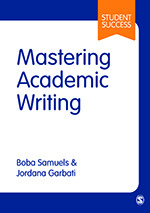Mastering Academic Writing
- Boba Samuels - University of Toronto, Canada
- Jordana Garbati - Wilfrid Laurier University, Canada
Student Success
Using their years of experience coaching students, the authors help you to:
- Develop and hone arguments
- Organise and interpret source material
- Write effective research proposals
- Follow academic conventions with confidence
- Complete collaborative writing projects.
Perfect for anyone transitioning from undergraduate to postgraduate degrees, Mastering Academic Writing provides the skills, tips, and tricks you need to move beyond the basics of academic writing and meet the new expectations of further study.
Student Success is a series of essential guides for students of all levels. From how to think critically and write great essays to boosting your employability and managing your wellbeing, the Student Success series helps you study smarter and get the best from your time at university.
Supplements
Visit our hub for free academic skills, wellbeing and employability resources from our new and bestselling guides, designed to support you from day one all the way through to graduation and beyond.
The case format establishes a narrative arc to each chapter to engage students in the chapter contents. Real student experiences give the text credibility and ground the advice about writing in real contexts. The focus on writing processes, advanced academic genres, and revision make this book an excellent choice for undergraduates and masters students across the disciplines.
It helps learners contemplate the academic challenges they face and apply that learning also to real life, giving them a feeling of achievement for only addressing the problem, but also becoming able to overcome it. It is also helpful in encouraging individuals to seek support when it comes to academic assignments.
This book is an excellent source for those returning to education who need to produce high quality academic work.
ADOPTED AS PART OF GENERAL ACADEMIC SKILLS MODULE
Useful for all students attending university and tutors to use in sessions to assist students in academic writing
German and international students alike will benefit from a well-structured, case-orientated and thus easily relatable approach that the book follows.
Students at proficiency level B2 and above that I encounter in the EGAP and ESAP courses at the Ruhr University in Bochum are very likely to have struggled with similar challenges in writing for academia to the ones used as examples in the book. For this reason, I am convinced that numerous tasks aimed to reflect and revise one's writing practice should prove of great relevance and usefulness mostly due to their transferable character.
At first glance I thought this appeared a little text-heavy; however, once I started reading, I realised that this was well-supported by the organisation of the book. Naturally, writing skills books need to include a lot of text, and making them engaging and interesting isn't easy... If there was a revised version, I would recommend looking at ways of breaking up the text a little more to avoid that first-glance impression.
The use of an intro 'story' to provide context for the skills is innovative and very practical. The development of the revised versions clarifies the decisions made, and why they have been made. The short dialogues between student and tutor are perhaps a little contrived, but they are purposeful and clear. I can definitely see that using this scaffolding in class, or guiding my students towards it, would be extremely helpful. I think this book provokes thought, and students would need to spend quite a lot of time to fully benefit from the many directions towards revisions in writing, addressing different issues each time. For this reason, I would think carefully about who to recommend this to - some of our foundation students are returning to education after many years, and I can think of many of them who would see this text as a very good insight into the mystery world of academic writing, whereas some of our younger students may see it as a bit of a chore and would prefer quicker fixes.
The summary points are useful as reminders - there was such a lot of content in places, I definitely needed these to remind myself of the focus of the chapter.
Overall, I think this is a fresh way to help my students de-mystify the writing process and to develop their academic writing. I've added it to the list of recommended books for both the Academic Practice module and the Extended Research Project, not just for Business but for all of our routes.
This book is a must read for nursing students who have not written essays for a period of time. There is quite a jump in learning how to master academic writing and this book helps that transition.








